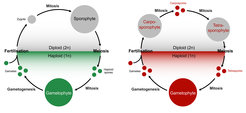Michael Borg
Development and Chromatin Biology in Red Algae
Max Planck Institute for Biology Tübingen
Adjunct faculty in: IMPRS
Vita

- PhD, University of Leicester, UK (2010)
- BBSRC-funded Postdoc, University of Leicester, Leicester, UK (2011-2014)
- Lise Meitner Fellow and Senior Postdoc, Gregor Mendel Institute, Vienna, Austria (2014-2020)
- Group Leader, Department of Algal Development and Evolution, MPI for Biology, Tübingen, Germany (since 2021)
Research Interest
The development of complex multicellular organisms is controlled through the interplay of both genetic and chromatin-based information. Although the impact of these molecular process on animal and plant development is well-understood, their function and relevance in marine algae is largely unexplored. Our newly-formed group aims to tackle these questions by leveraging an interdisciplinary approach using bulk and single-cell genomics, cell biology, biochemistry, and evolutionary biology in model organisms of brown and red algae. Our main focus is red algae, an ancient eukaryotic phylum of aquatic organisms within the Plant kingdom that date back at least 1.2 billion years. They played a key role in the evolution of life on our planet by being the ancient donor of plastids to other major groups of algae like dinoflagellates, diatoms and brown algae. Given that they form a divergent lineage that is sister to all green algae and plants, red algae also make a compelling case study for comparative evolutionary studies within the Plant kingdom. Despite their unique phylogenetic position, their ancient origins and the essential role they play in aquatic ecosystems, virtually nothing is known about red algae at a molecular level. Our goal is to tackle the genetics and epigenetics underlying development and reproduction in this fascinating group of eukaryotes, which we aim to place in a broader light through comparative studies with their green cousins to reveal the evolutionary forces that drove the diversity of developmental strategies across the Plant kingdom.


Available PhD Projects
- Currently not recruiting PhD students
Selected Reading
- Vigneau, J. and Borg, M., 2021. The epigenetic origin of life history transitions in plants and algae. Plant Reproduction, 34(4): 267-285.
- Borg, M., Papareddy, R.K., Dombey, R., Axelsson, E., Nodine, M.D., Twell, D. and Berger, F., 2021. Epigenetic reprogramming rewires transcription during the alternation of generations in Arabidopsis. Elife, 10: e61894.
- Borg, M., Jiang, D. and Berger, F. Histone variants take center stage in shaping the epigenome. 2021. Current Opinion in Plant Biology, 61: 101991.
- Borg, M., Jacob, Y., Susaki, D., LeBlanc, C., Buendia, D., Axelsson, E., Kawashima, T., Voigt, P., Boavida, L.C., Becker, J.D., Higashiyama, T., Martienssen, R. and Berger,. F. 2020. Targeted reprogramming of H3K27me3 resets epigenetic memory in plant paternal chromatin. Nature Cell Biology, 22(6): 621.
- Jiang, D., Borg, M., Lorković, Z.J., Montgomery, S.A., Osakabe, A., Yelagandula, R., Axelsson, E. and Berger, F., 2020. The evolution and functional divergence of the histone H2B family in plants. PLoS Genetics, 16(7): p.e1008964.


